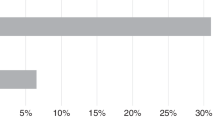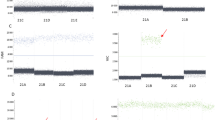Abstract
For over four decades, it has been possible to offer prenatal diagnostic testing for fetal abnormalities. Prenatal testing is now available for a wide range of monogenic disorders as well as chromosomal abnormalities and should be provided within the ethical framework of informed consent and autonomous choice. However, there are no published guidelines for health professionals from varied disciplines who offer prenatal diagnosis (PND) in a range of possible settings including departments of maternity, obstetrics and clinical genetics. We used an Expert Group technique to develop a set of guidelines for provision of prenatal diagnostic services. Thirteen European health professionals, all experts in PND, participated in a workshop to develop the guidelines, which were then subjected to a wide consultation process. The objective of PND was defined as providing prenatal diagnostic testing services (for genetic conditions) that enable families to make informed choices consistent with their individual needs and values and which support them in dealing with the outcome of such testing. General principles, logistical considerations, clinical care and counselling topics are all described and are equally applicable to invasive and non-invasive testing. These guidelines provide a framework for ethical clinical care; however, they are flexible enough to enable practitioners to adapt them to their particular setting. Ideally, an individualised approach to each family is required to ensure autonomous choice and informed consent regarding prenatal diagnostic testing within the local ethical and legal framework.
Similar content being viewed by others
Log in or create a free account to read this content
Gain free access to this article, as well as selected content from this journal and more on nature.com
or
Change history
17 April 2014
This article has been amended since online publication and a corrigendum appears in this issue.
References
Wolstenholme J, Rooney DE : Cytogenetics in the 1970s and 1980s. Prenat Diagn 2010; 30: 605–607.
Raymond FL, Whittaker J, Jenkins L, Lench N, Chitty LS : Molecular prenatal diagnosis: the impact of modern technologies. Prenat Diagn 2010; 30: 674–681.
Wieacker P, Steinhard J : The prenatal diagnosis of genetic diseases. Dtsch Arztebl Int 2010; 107: 857–862.
Lo TK, Lai FK, Leung WC, Lau WL, Tang LC, Chin RK : A new policy for prenatal screening and diagnosis of Down syndrome for pregnant women with advanced maternal age in a public hospital. J Matern Fetal Neonatal Med 2010; 23: 914–919.
Muhsen K, Na’amnah W, Lesser Y, Volovik I, Cohen D, Shohat T : Determinates of underutilization of amniocentesis among Israeli Arab women. Prenat Diagn 2010; 30: 138–143.
Nakata N, Wang Y, Bhatt S : Trends in prenatal screening and diagnostic testing among women referred for advanced maternal age. Prenat Diagn 2010; 30: 198–206.
UK National Screening Committee: Screening for Down’s syndrome: UK NSC Policy recommendations 2011–2014 Model of Best Practice . 2011 (Online). Available at http://fetalanomaly.screening.nhs.uk/aboutus (accessed 13 May 2013).
Hill M, Barrett AN, White H, Chitty LS : Uses of cell free fetal DNA in maternal circulation. Best Pract Res Clin Obstet Gynaecol 2012; 26: 639–654.
Chitty L, Bianchi D : Noninvasive prenatal testing: the paradigm is shifting. Prenat Diagn 2013; 33: 511–513.
Knoppers BM, Isasi RM : Regulatory approaches to reproductive genetic testing. Hum Reprod 2004; 19: 2695–2701.
Klein RD, Mahoney MJ : Medical legal issues in prenatal diagnosis. Clin Perinatol 2007; 34: 287.
Hunt LM, de Voogd KB, Castañeda H : The routine and the traumatic in prenatal genetic diagnosis: does clinical information inform patient decision-making? Patient Educ Couns 2005; 56: 302–312.
Reid B, Sinclair M, Barr O, Dobbs F, Crealy G : A meta-synthesis of pregnant women's decision-making processes with regard to antenatal screening for Down syndrome. Soc Sci Med 2009; 69: 1561–1573.
Potter BK, O’Reilly N, Etchegary H et al: Exploring informed choice in the context of prenatal testing: findings from a qualitative study. Health Expect 2008; 11: 355–365.
Tschudin S, Huang D, Mor-Gültekin H, Alder J, Bitzer J, Tercanli S : Prenatal counselling—implications of the cultural background of pregnant women on information processing, emotional response and acceptance. Ultraschall In Der Medizin 2011; 32 (Suppl 2): E100–E107.
Kuppermann M, Learman LA, Gates E et al: Beyond race or ethnicity and socioeconomic status: predictors of prenatal testing for Down syndrome. Obstet Gynecol 2006; 107: 1087–1097.
Alsulaiman A, Hewison J, Abu-Amero KK, Ahmed S, Green J, Hirst J : Attitudes to prenatal diagnosis and termination of pregnancy for 30 conditions among women in Saudi Arabia and the UK. Prenat Diagn 2012; 32: 1109–1113.
Boon E, Faas B : Benefits and limitations of whole genome versus targetted approaches for noninvasive prenatal testing for fetal aneuploidies. Prenat Diagn 2013; 33: 563–568.
Lench NB, Fielding S, McKay F et al: The clinical implementation of non-invasive prenatal diagnosis for single gene disorders: challenges and progress made. Prenat Diagn 2013; 33: 555–562.
Skirton H, Patch C : Factors affecting the clinical use of non-invasive prenatal testing: a mixed methods systematic review. Prenat Diagn 2013; 33: 532–541.
Lewis C, Hill M, Skirton H, Chitty LS : Non-invasive prenatal diagnosis for fetal sex determination: benefits and disadvantages from the service users' perspective. Eur J Hum Genet 2012; 20: 1127–1133.
Tischler R, Hudgins L, Blumenfeld YJ et al: Noninvasive prenatal diagnosis: pregnant women's interest and expected uptake. Prenat Diagn 2011; 31: 1292–1299.
Kelly SE, Farrimond HR : Non-invasive prenatal genetic testing: a study of public attitudes. Public Health Genomics 2012; 15: 73–81.
Hill M, Compton C, Lewis C, Skirton H, Chitty LS : Determination of foetal sex in pregnancies at risk of haemophilia: a qualitative study exploring the clinical practices and attitudes of health professionals in the United Kingdom. Haemophilia 2012; 18: 575–583.
Devers PL, Cronister A, Ormond KE, Facio F, Brasington CK, Flodman P : Noninvasive prenatal testing/noninvasive prenatal diagnosis: the position of the national society of genetic counselors. J Genet Counsel 2013; 22: 291–295.
van den Heuvel A, Chitty LS, Dormandy E et al: Will the introduction of non-invasive prenatal diagnostic testing erode informed choices? An experimental study of health care professionals. Patient Educ Couns 2010; 78: 24–28.
Hill M, Fisher J, Chitty LS, Morris S : Women’s and health professionals' preferences for prenatal tests for Down syndrome: a discrete choice experiment to contrast noninvasive prenatal diagnosis with current invasive tests. Genet Med 2012; 14: 905–913.
Benn PA, Chapman AR : Ethical challenges in providing noninvasive prenatal diagnosis. Curr Opin Obstet Gynecol 2010; 22: 128–134.
Holland A, Whittington J, Cohen O et al: The European Prader-Willi Syndrome Clinical Research Database: an aid in the investigation of a rare genetically determined neurodevelopmental disorder. JIDR 2009; 53 (Part 6): 538–547.
Thariani R, Wong W, Carlson JJ et al: Prioritization in comparative effectiveness research: the CANCERGEN Experience. Med Care 2012; 50: 388–393.
Eldahdah LT, Ormond KE, Nassar AH, Khalil T, Zahed LF : Outcome of chromosomally abnormal pregnancies in Lebanon: obstetricians' roles during and after prenatal diagnosis. Prenat Diagn 2007; 27: 525–534.
Williams CP, Alderson P, Farsides B : Is nondirectiveness possible within the context of antenatal screening and testing? Soc Sci Med 2002; 54: 339–347.
Kuppermann M, Learman LA, Gates E et al: Computerized prenatal genetic testing decision-assisting tool: a randomized controlled trial. Obstet Gynecol 2009; 113: 53–63.
Barr O, Skirton H : Informed decision making regarding antenatal screening for fetal abnormality in the United Kingdom: a qualitative study of parents and professionals. Nurs Health Sci 2013, e-pub ahead of print 24 January 2013; doi:10.1111/nhs.12034.
Lewis C, Hill M, Skirton H, Chitty LS : Fetal sex determination using cell-free fetal DNA: service users' experiences of and preferences for service delivery. Prenat Diagn 2012; 32: 735–741.
Jackson L, Goldsmith L, O’Connor A, Skirton H : Incidental findings in genetic research and clinical diagnostic tests: a systematic review. Am J Med Genet 2012; 158A: 3159–3167.
Hunt LM, de Voogd KB : Are good intentions good enough? Informed consent without trained interpreters. J Gen Intern Med 2007; 22: 598–605.
Learman LA, Kuppermann M, Gates E, Nease RF, Gildengorin V, Washington AE : Social and familial context of prenatal genetic testing decisions: are there racial/ethnic differences? Am J Med Genet 2003; 119C: 19–26.
Vetro A, Bouman K, Hastings R et al: The introduction of arrays in prenatal diagnosis: a special challenge. Hum Mutat 2012; 33: 923–929.
Acknowledgements
This study was funded under the EuroGentest Coordination Action 2011 – EU Contract no.: HEALTH-F4-2010-2614692 project. The workshop participants who contributed greatly to the guidelines were: Katia Bilardo, Outi Kamarainen, Helena Kaariaianen, Susan Kelly, Faustina Lalatta Milan Macek, Olav Petersen, Thomy de Ravel, Martina Rodriguez de Alba, Maria Soller and Sally Taffinder. We acknowledge the support of Jan Preece in helping to organise the workshop. LSC is partially funded by the National Institute of Health Research Biomedical Research Centre at Great Ormond Street Hospital and the Great Ormond Street Hospital Children’s Charity.
DISCLAIMER
The views expressed in the article are those of the authors and not necessarily those of the NHS, the NIHR or the Department of Health.
Author information
Authors and Affiliations
Corresponding author
Ethics declarations
Competing interests
The authors declare no conflict of interest.
Additional information
Supplementary Information accompanies this paper on European Journal of Human Genetics website
Supplementary information
Rights and permissions
About this article
Cite this article
Skirton, H., Goldsmith, L., Jackson, L. et al. Offering prenatal diagnostic tests: European guidelines for clinical practice. Eur J Hum Genet 22, 580–586 (2014). https://doi.org/10.1038/ejhg.2013.205
Received:
Revised:
Accepted:
Published:
Issue date:
DOI: https://doi.org/10.1038/ejhg.2013.205
Keywords
This article is cited by
-
Facilitating informed choice about non-invasive prenatal testing (NIPT): a systematic review and qualitative meta-synthesis of women’s experiences
BMC Pregnancy and Childbirth (2019)
-
Limits to the scope of non-invasive prenatal testing (NIPT): an analysis of the international ethical framework for prenatal screening and an interview study with Dutch professionals
BMC Pregnancy and Childbirth (2018)
-
Prenatal diagnostic services in three regional centers in Vietnam
International Journal of Public Health (2017)
-
Attitudes of women of advanced maternal age undergoing invasive prenatal diagnosis and the impact of genetic counselling
European Journal of Human Genetics (2016)
-
Development and validation of a measure of informed choice for women undergoing non-invasive prenatal testing for aneuploidy
European Journal of Human Genetics (2016)



